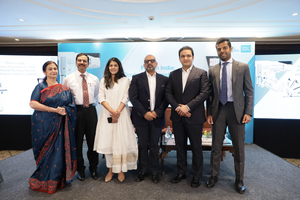
Minimally invasive robotic surgery cures woman from a deadly cancer
text_fieldsThe woman underwent minimally invasive robotic surgery with the doctors at Apollo Cancer Centre (ACC) who carried out the surgery.
Chennai: A woman cured of Pseudomyxoma Peritonei (PMP), a rapidly spreading appendix cancer using a cutting-edge medical technology—a minimally invasive robotic-assisted approach—that aided in the removal of a residual tumor.
The global estimated incidence of PMP is approximately 1 to 4 out of a million, annually. It appears to be more common in women, majorly in their 50s. The patient, aged 51, was diagnosed with bilateral ovarian masses and had extensive surgical intervention, including the removal of the uterus, ovaries, appendix, and part of the omentum.
Subsequent examination revealed a high-grade mucinous tumour of the appendix with PMP, necessitating additional surgery. The patient was found to have gelatinous deposits that remain in the abdomen post-surgery for appendicular mucinous tumours in the pelvis and around the cecum (first part of the colon).
Due to the peculiar tendency of appendix cancer to spread to the lining of the patient's abdomen (peritoneum), doctors at Apollo Cancer Centre (ACC), resorted to minimally invasive Robotic Cytoreductive Surgery (CRS). The surgery completely removed residual tumours from the abdomen.
CRS was performed “to reduce the number of cancer cells in the abdominal cavity with right hemicolectomy (removing the colon which bears the appendix) and complete mesocolic excision (surgery for treating cancer arising from the colon and appendix) and peritonectomy and total omentectomy, along with Hyperthermic intraperitoneal chemotherapy (heated chemotherapy with a chemo drug) eliminating any possible microscopic residual tumours inside the abdomen,” said Dr. Ajit Pai, Senior Consultant in Surgical Oncology and Robotic Surgery, at ACC on Thursday.
The robotic CRS approach is minimally invasive and minimises pain, blood loss, scarring, and discomfort. It also translates to a faster recovery and a quicker return to normal life for the patient. “At one-year follow-up, she remains in perfect health and cancer-free,” the doctor said.
“Robotic CRS offers a transformative approach, requiring expertise in traditional and robotic techniques for precise tumour resections. With reduced postoperative morbidity, minimal access, and quicker recovery, this method is a viable choice for patients whose cancer cells have spread to and implanted on the peritoneal surfaces in a limited manner,” Dr. Ajit said.
“We are thrilled with the successful clinical outcome and the potential this approach holds for improving the lives of patients battling peritoneal surface cancers, including those from ovarian, colonic, and gastric malignancies,” he added.
Source: IANS











